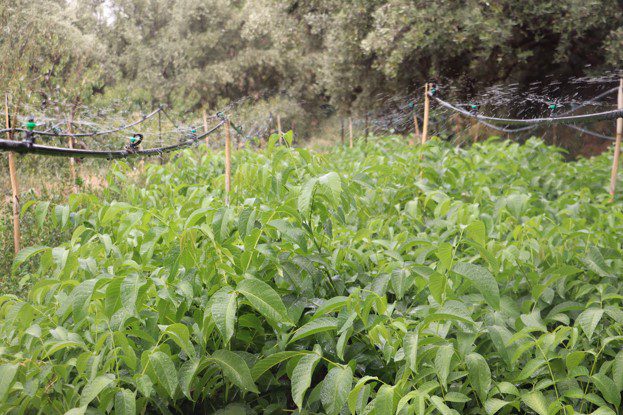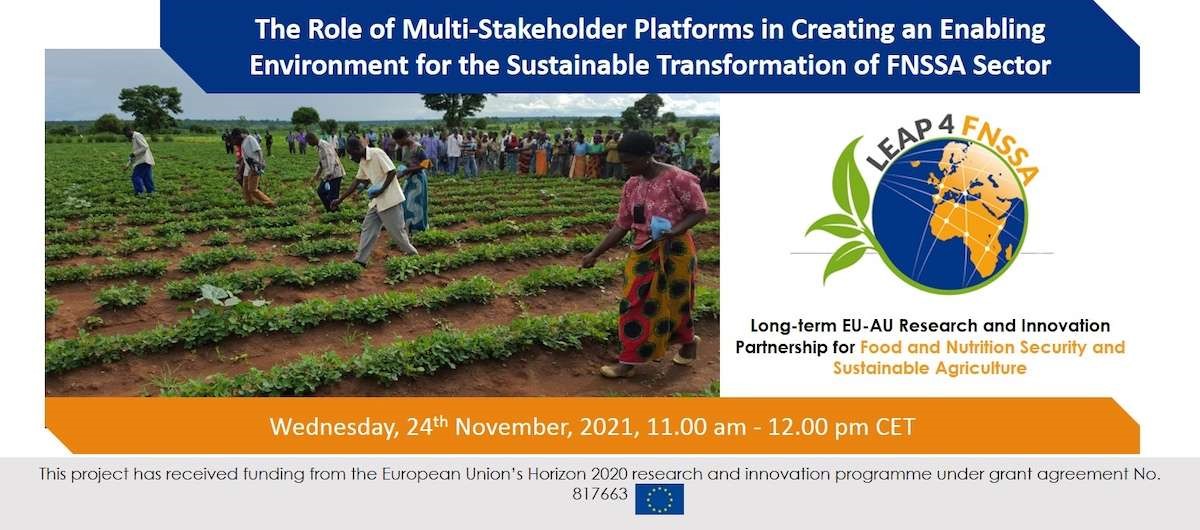On November 24th, 2021, the Coordination and Support Action (CSA) LEAP4FNSSA held a webinar about “The Role of Multi-Stakeholder Platforms in Creating an Enabling Environment for the Sustainable Transformation of the FNSSA Sector.” The main objective of LEAP4FNSSA is to provide a tool for European and African institutions to engage in a Sustainable Partnership Platform for research and innovation on Food and Nutrition Security, and Sustainable Agriculture (FNSSA).
This webinar was all about “establishing a sustainable structure, or platform, for the efficient and coherent implementation of the EU-AU Research and Innovation Partnership as described in the FNSSA Roadmap”(Norhan El Dallal). This platform should support the bureau of AU-EU High Level Policy Dialogue (HLPD), strengthen the knowledge base and increase the efficiency of the AU-EU Research and Innovation Partnership, as well as facilitate the relevant FNSSA research and innovation networks.
First, a Multi-Stakeholder Platform was presented. This platform is about participatory decision-making and information sharing. Key stakeholders should be represented and decide what issues to focus on and what actions to take. Multi-stakeholder platforms bring together representatives from different interest groups to discuss shared challenges, opportunities, policy actions and advocacy strategies. They have the potential to tackle complex development challenges, to assist in the scaling up of necessary innovations, and to possibly enhance the sense of ownership, support developing knowledge, create linkages between different governance levels and a wide variety of actors, and, most importantly, improve policy making.
Further, Philippe Petithuguenin, Deputy Director general in charge of Research and Strategy in the French Agriculture Research Centre for International Development (CIRAD), shared the International Research Consortium (IRC) approach. IRC is a group of research and innovation institutions that work under a shared governance mechanism towards a commonly defined goal. The IRC has a Partnership in FNSSA to establish a sustainable structure, or platform, for the efficient and coherent implementation of the EU-AU Research and Innovation Partnership. Through the IRC, multiple benefits are provided, such as increasing the impact of initiatives by facilitation synergies with other institutional alliances, optimizing the utilization of work and results,gaining access to funding programmes and opportunities, and, last but not least, gaining greater recognition and visibility for one’s contribution to the EU-AU partnership supported by authorities.
Lastly, Simon Winter, Executive Director of Syngenta Foundation for Sustainable Agriculture, demonstrated Multi-Stakeholder Initiatives. As an example, he stated that the Agri-Entrepreneurs Foundation (AEG), which creates tangible transformation for rural households and farmers in India, adopts a decentralized approach towards empowering rural youth, brings services including market linkages, provides access to high-quality inputs, and gives agronomic advisory and finance. The AEG also helps in accelerating innovations and addressing climate changes.
The High Atlas Foundation (HAF), which is committed to furthering sustainable development & supporting Moroccan communities to take action in implementing human development initiatives, is an NGO that uses a participatory approach to involve all stakeholders. The communities HAF works with are asked for their skills and needs to be able to respond to them individually.





